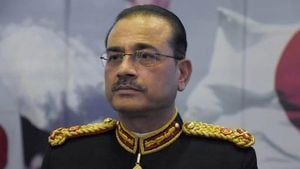On the bustling streets of Metro Manila, the daily grind for millions of Filipinos often comes with the burden of rising costs—electricity, transportation, and basic services. But as of late October 2025, a series of government and private sector initiatives have begun to offer a glimmer of hope, especially for the country’s most vulnerable citizens: senior citizens and low-income households.
In a move that could reshape household budgets across the nation, Senior Citizens Party-list Representative Rodolfo “Ompong” Ordañes has thrown his full weight behind the Department of Energy’s (DOE) bold proposal to remove the value-added tax (VAT) on electricity. According to the Manila Bulletin, Ordañes described the measure as a lifeline for senior citizens, many of whom struggle to keep up with monthly utility bills. "For many of us, electricity is not just a basic need but a lifeline for every home. For senior citizens, access to electricity equates to comfort and safety which is very important for the vulnerable sector of the society," Ordañes said.
The lawmaker’s support comes at a crucial time. Electricity rates in the Philippines are among the highest in Southeast Asia, and the VAT on power consumption only adds to the financial strain. Ordañes praised Energy Secretary Sharon Garin for her "clear act of compassion" in pushing for the VAT removal. "Many seniors still shoulder the cost of electricity in their households. That is why we are ready to work hand in hand with the DOE to ensure that this initiative gets the attention it deserves. This will not only ease the struggles of our elderly but also guarantee a more comfortable life through continued access to electricity," Ordañes emphasized, as reported by Philippine Star.
But the push for relief doesn’t stop with VAT. The Senior Citizens Party-list is also advocating for an increase in the electricity discount for indigent and low-consuming seniors. At present, those who use up to 100 kilowatt-hours per month are entitled to a 5-percent discount. Ordañes has introduced House Bill 434, aiming to triple this benefit to 15 percent for qualifying senior citizens. "To further reduce their expenses, we have filed House Bill 434, which seeks to raise the discount to 15 percent for senior citizens under the same category," he explained.
The private sector hasn’t been idle either. The Senior Citizens Party-list has lauded enterprises and utilities that actively implement the mandated discounts, calling them proof that effective partnerships between government and business can yield tangible benefits for society’s most vulnerable. This collaborative spirit was on display during the recent Household Electrification Program lighting ceremony organized by the One Meralco Foundation in Novaliches, Quezon City. Ordañes was among those present as more than 160 households were connected to stable and reliable electricity—an event that brought both practical benefits and emotional uplift. "I saw the joy on the faces of the elderly beneficiaries who can now enjoy the benefits of having electricity in their homes," Ordañes shared, according to Business Mirror.
Ordañes has reaffirmed his commitment to championing fair and inclusive access to electricity. "As your voice in Congress, I will not stop fighting for decent, fair and inclusive access to electricity," he declared. For many Filipinos, such pledges are more than political rhetoric—they represent a concrete response to the daily grind of high living costs and bureaucratic hurdles.
The potential impact of removing VAT on electricity is significant. With inflation and utility rates stubbornly high, every peso counts for families and retirees. If enacted, the measure could provide immediate relief for millions already "saddled with the rising cost of living and sinking in the quagmire of corruption," as one editorial in the Daily Tribune put it. The hope is that this initiative, combined with increased discounts for seniors, will ease the burden on those who need it most.
Meanwhile, another government agency is making headlines for a different kind of fiscal prudence. Acting Transportation Secretary Giovanni Lopez has taken a stand against unnecessary spending by reallocating a P50-million budget originally earmarked for new vehicles at the Department of Transportation (DOTr) central office. Instead, that money will now be used to improve the facilities of the Land Transportation Office (LTO) and the Land Transportation Franchising and Regulatory Board (LTFRB)—two agencies that serve millions of Filipinos every year.
In a memorandum dated October 16, 2025, Lopez explained that the move was in direct response to President Ferdinand Marcos Jr.’s directive to provide the public with the services they "need and deserve." According to Philippine Daily Inquirer, the reallocated funds will go toward upgrading waiting and client areas, including the installation of air-conditioning units, water dispensers, and sufficient chairs. The improvements are intended to make the process of securing licenses, registrations, and other transportation-related documents less of a test of patience—and more of a dignified experience.
Lopez’s directive also comes with a strict timeline: the funds are valid only until the end of 2025, and both the LTO and LTFRB have been ordered to ensure efficient use of the budget. The move has been widely praised by both commuters and advocacy groups, who have long complained about the conditions in government offices. "This has been long overdue. We’re so grateful Secretary Lopez has finally recognized the inconvenience their clients have to endure every time they process their documents even as the agency has been collecting and earning from them," noted a columnist in the Manila Times.
These developments, while distinct in their immediate focus, point to a broader trend in Philippine governance: a renewed emphasis on public service, transparency, and the welfare of ordinary citizens. Whether it’s easing the burden of electricity bills or making the process of dealing with government agencies less arduous, the underlying message is clear—public officials are being called to account for the everyday struggles of the people they serve.
At the same time, the private sector’s involvement—from utilities like the One Meralco Foundation to media giants such as ABS-CBN, which continues to promote Filipino values and public service—highlights the importance of cross-sector collaboration. As the nation grapples with economic challenges and the ever-present specter of corruption, these partnerships offer a template for progress that is both practical and compassionate.
For now, Filipino households—especially seniors and those living on the margins—are watching closely. The promise of lower electricity bills, improved public services, and a more responsive government is more than welcome news; it’s a small but meaningful step toward a society where comfort, safety, and dignity are not privileges, but rights enjoyed by all.




